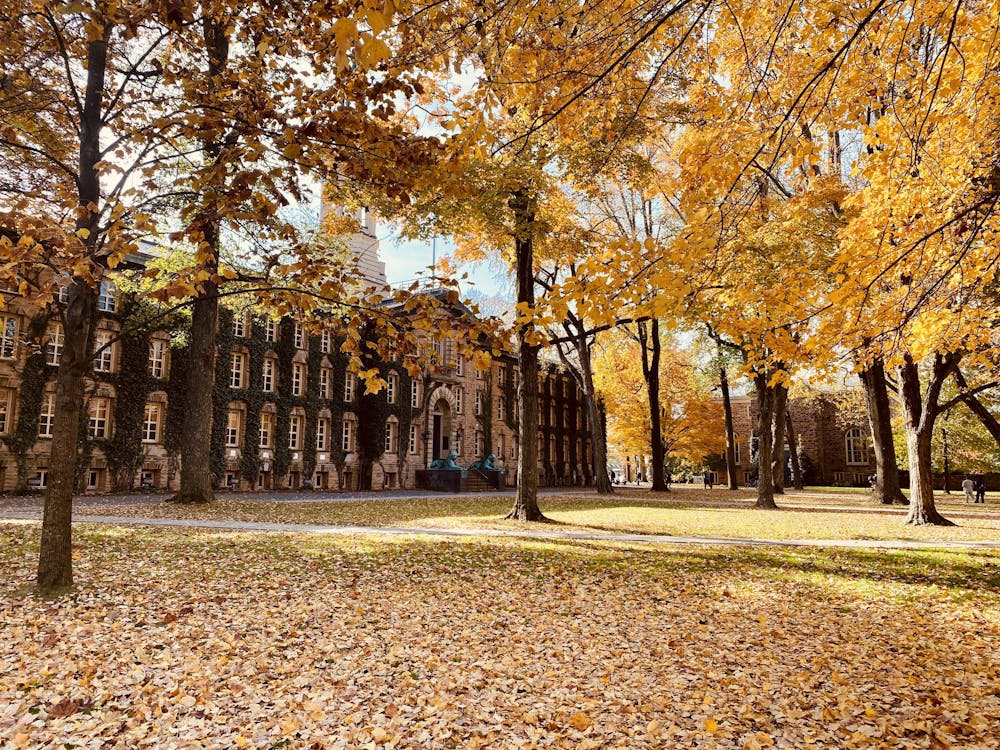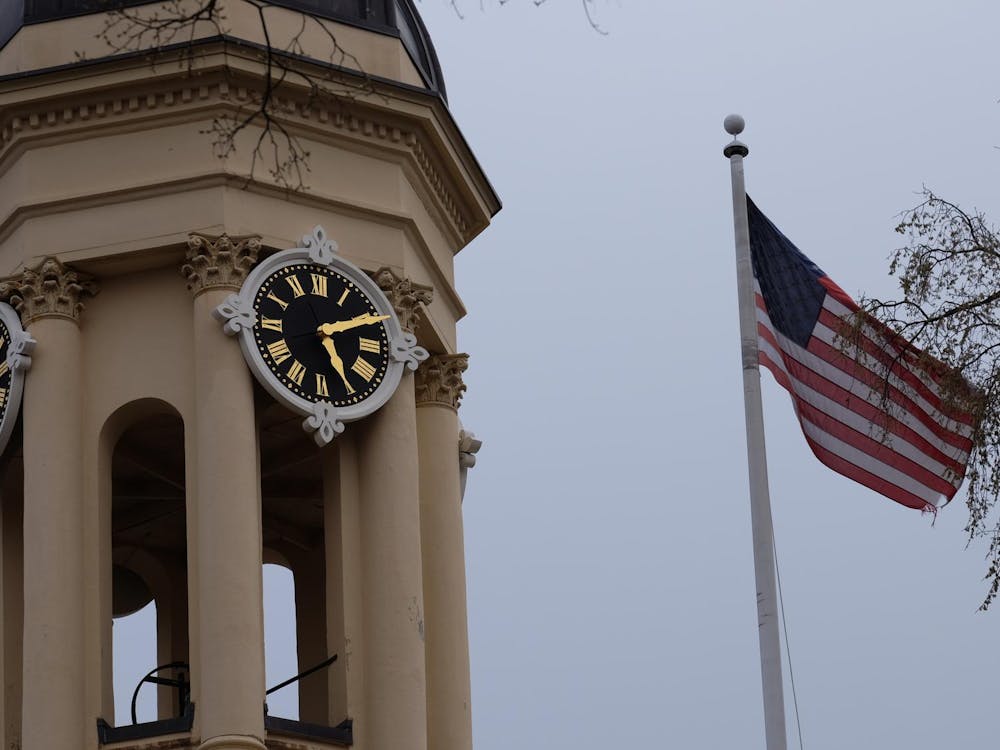The ‘Prince’ recently published its Class of 2029 Frosh Survey, featuring data on everything from the incoming class’s familiarity with AI models to its knowledge of prominent Princeton alumni to its past sexual experiences. Here, five of our Opinion editors identify and tackle key takeaways about Princeton’s newest class.
Trump can't scare us away from the life of the mind
Frances Brogan, Head Opinion Editor
University President Christopher Eisgruber ’83 has been inundated with praise for his handling of the Trump administration’s attacks on higher education. While he’s been an admirable defender of the University, Princeton’s strongest insulation against the federal assault on higher education isn’t Eisgruber’s rhetorical prowess. Rather, it’s the irrepressible and tenacious intellectual curiosity of incoming classes — including the substantial portion who want to devote their lives to the Ivory Tower.
According to the ‘Prince’ Class of 2029 Frosh Survey, 40.6 percent of the new class is considering pursuing a career in academia — a higher percentage than for any other field. This is consistent with data from past Frosh Surveys — 42.1 percent of the Class of 2028 reported an interest in academia, as did 40.6 percent of the Class of 2027. This suggests that political hostility towards higher education isn’t discouraging each successive batch of Princeton students from at least contemplating the kinds of jobs the government is trying to eradicate.
The Trump administration wants to muzzle intellectuals and squelch academic research because nothing threatens an aspiring autocrat more than the flourishing of free thought and ideological diversity. A university is a petri dish for potential challengers and dissidents, nurturing young people who could reshape this country according to radically different values than those Trump and his lackeys seek to impose.
The Frosh Survey shows that new Princetonians aren’t cowed by the current political climate. Their aspirations demonstrate that the ideal of the university is conceptually durable. After all, a lot of smart kids still believe so strongly in the value of academia that they plan to make it their vocation.
Head Opinion editor Frances Brogan is a junior in the History department from Lancaster, Pa. She can be reached at frances.brogan[at]princeton.edu.

On progressive activism, Princetonians remain agnostic
Siyeon Lee, Associate Opinion Editor
While a culture of political apathy has long been predominant at Princeton, this year’s Frosh Survey serves as a stark reminder that activists are not drawn to Princeton. Nearly 43 percent and 63 percent of the Class of 2029, respectively, responded that they had “not enough information” about the “Gaza Solidarity Encampment,” nor the University’s response to it, to form a coherent opinion about the events.
This is strange; although Princeton did not receive the same kind of federal lambasting nor media coverage as peer schools like Columbia or Harvard, Princeton’s encampment was covered rather robustly by national and local media outlets.

Of course, there are many reasons why students could have opted out of sharing their views on the topic. And the student body’s degree of commitment to “advancing social justice” — which a majority of first-years believed was a prominent community sentiment — isn’t something that can be measured by new students’ views on the encampment alone.
But the fact that nearly 40 percent of the new admits have positive opinions about President Eisgruber’s response to federal uncertainty suggests the Class of 2029 is far from uninformed about Princeton’s role in national politics. Rather, apathy about the encampment signals comfort with mainstream political narratives and aversion to more “radical” political discourse — a sign of the student body’s enduring political timidity.
The apathy surrounding the Gaza Solidarity Encampment, then, is less an anomaly than a reflection of Princeton’s continued cultural distance from progressive activism.
Siyeon Lee is a junior associate Opinion editor from Seoul, South Korea majoring in History. She can be reached at siyeonlee[at]princeton.edu.
Class of 2029, take a stance on SCOTUS
Lily Halbert-Alexander, Assistant Opinion Editor
Princeton’s reputation today is staked in the institution’s emergence as a defender of speech and intellectual freedom. This was not lost in the Class of 2029. According to the Frosh Survey, more than 85 percent at least somewhat agreed that Princeton is “an intellectual haven where free speech and dissent are welcomed.”
To value Princeton as a paradise for productive disagreement is to value the foundations of discourse, which, in an ideal world, Supreme Court justices uphold. But just under 60 percent of frosh report having “not enough information” to form an opinion of Princeton alumnus Justice Samuel Alito ’72 — the author of the 2022 decision to overturn Roe v. Wade — or alumna Justice Elena Kagan ’81. Thirty-one percent cited no opinion on Justice Sonia Sotomayor ’76, who is now the namesake of the Admission Information Center and U-Store.
Students coming of age in a time of political turmoil appear woefully uninformed about the Supreme Court, the very institution precipitating much of this unrest. While it might seem that all we do is talk politics, new Princeton students seem to struggle to think critically about the individual actors whose decisions impact all of our lives.
We must confront political power not as a single, faceless force but as the assemblage of individuals — like Alito, Kagan, and Sotomayor — who we all, as fellow individuals, have the capacity and right to criticize. It’s not our job as students to know everything, but it’s our privilege and responsibility to have an opinion, and to take full advantage of Princeton’s status as a free-speech “haven” where we can develop, test, express, and maybe even change our opinions.
Lily Halbert-Alexander is a sophomore assistant Opinion editor from San Francisco, Calif., majoring in English. She has decidedly enough information to form an opinion on Samuel Alito. She can be reached at lh1157[at]princeton.edu.
The Class of 2029’s high school AI use shows where teaching priorities should lie
Shane McCauley, Assistant Opinion Editor
Members of the Class of 2029 are the first at Princeton to have had access to generative AI for the majority of their high school careers. So it’s particularly intriguing that, according to the Frosh Survey, 48.6 percent of first-years reported having used AI models for reading and writing assistance, but only 44.8 percent for STEM work.
This surprised me. At Princeton, it’s somewhat normalized to turn to AI for help with STEM, but it is still generally frowned upon in the humanities, with many courses — and some entire departments — barring the technology entirely.
But if younger Princetonians are already accustomed to using AI for reading and writing, prohibition of the technology alone is no longer enough. Introductory humanities courses must find proactive ways to ensure students learn critical thinking skills they may not have practiced in high school to the same extent as older Princetonians.
Intro STEM classes like COS 217: Introduction to Programming Systems have begun testing student understanding through quizzes on programming assignments, as opposed to weighing assignments themselves highly. Professors should consider implementing analogous solutions in the humanities, perhaps by replacing weekly reading responses that are typically completed outside of class with in-class writing exercises or structured class discussions.
In first-year Writing Seminars, this is especially important to consider. Although longer research papers are vital, the Writing Program should use in-class writing exercises to further encourage the development of original ideas, a central theme of the course.
When students arrive at Princeton having already used AI extensively and across disciplines, we need to center critical thinking more than ever.
Shane McCauley is an assistant Opinion editor from Boston. He can be reached at sm8000[at]princeton.edu.
Who gets to drink at Princeton?
Charlie Yale, Assistant Opinion Editor
Each year, the ‘Prince’ Frosh Survey confirms at Princeton what researchers have known since at least 2015: Rich people drink more.
In the United Kingdom, a study found that approximately 70 percent of teens who were from the “least deprived” economic background drank, compared with around 50 percent from the “most deprived” group.
And at Princeton, students who do not receive financial aid are twice as likely to have had a drink before matriculating than students who receive full financial aid.
I don’t point this out to encourage more students who receive full aid to drink — and nor, for that matter, for non-aid receiving students to stop drinking. But this statistic is indicative of a larger problem within a slice of Princeton social life, and the University more generally. Wealthier frosh are also more likely to be legacy students and are more likely to say they want to join an eating club, a central part of upperclass social life.
In aggregate, this data suggests that students who have more money expect to feel more at home here.
While drinking and joining eating clubs are only a part of the vibrant social life that students can find at Princeton, and while it’s impossible to understand exactly why first-years answered the survey the way they did, statistics like these highlight socioeconomic inequalities that are still incredibly prevalent on our campus. Princeton has made headway in democratizing its academic and preprofessional offerings; it’s time for social options to follow suit.
Charlie Yale is an assistant Opinion editor from Omaha, Neb., who enjoys a (non-alcoholic) drink. He can be reached at cyale[at]princeton.edu.








